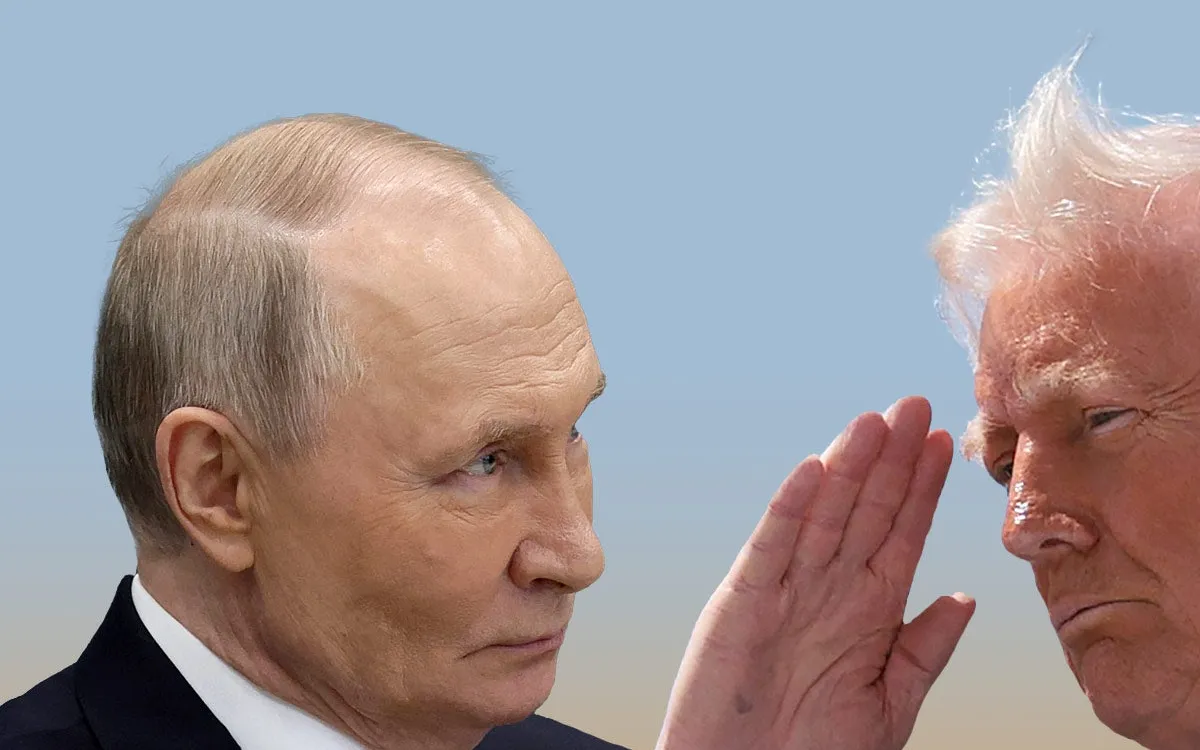
Sign up for the Slatest to receive the most insightful analysis, criticism, and advice delivered directly to your inbox every day. In a recent phone call lasting over two hours, Presidents Donald Trump and Vladimir Putin failed to make any significant progress toward resolving the ongoing Russia–Ukraine war. Given the brutal conflict, which has now entered its fourth year, this stalemate was not surprising to anyone closely following the situation—except, perhaps, for Trump, who expressed afterward that he believes Putin genuinely desires peace.
However, based on the summaries provided by both leaders regarding their conversation, it appears that Trump does not truly believe in Putin’s motives or care about them. Instead, Trump’s primary concern seems to be achieving a swift end to the war, allowing the United States and Russia to restore their relationship—regardless of whether this outcome requires Ukraine's surrender.
Trump characterized the “tone and spirit” of their discussion as “excellent,” while Putin described the talk as “frank and useful.” Yet, a closer examination reveals that neither leader was genuinely focused on discussing prospects for lasting peace. In recent weeks, Trump has intermittently called for an “immediate ceasefire,” a sentiment that Ukrainian President Volodymyr Zelensky has supported. Conversely, Putin has never endorsed this idea.
Earlier on the same day as the call, several European leaders urged Trump to reiterate this demand during his discussion with Putin. Despite having once threatened to impose new sanctions on Russia if Putin did not agree to a truce, Trump ignored their appeal. Meanwhile, Putin insisted that before any ceasefire can be achieved, the two nations must address the war's “root causes.” In Putin's view, this translates to questioning the very existence of Ukraine as a sovereign state, with its own language, culture, and aspirations to align with Europe. For Zelensky and most European leaders, this position equates to nothing less than surrender.
Trump did not challenge Putin on this vital point. He further stated that he would refrain from imposing sanctions or punishment on Russia, regardless of Putin's actions. He also shifted his earlier position, indicating that Russia and Ukraine would need to negotiate independently, diverging from his previous assertion that direct talks between him and Putin were essential to ending the war. Now, he suggested that if Putin refuses to engage in talks with Zelensky, he would simply “back away,” leaving the two nations to continue their conflict.
This indicates a clear bias. Trump recognizes that it is Putin, rather than Zelensky, who is resisting a ceasefire. However, if Russia maintains this stance, the U.S. will not enhance its support for Ukraine; instead, Trump appears willing to withdraw entirely. Trump has argued, with some analysts in agreement, that without robust U.S. support, Russia is likely to prevail in the war—a scenario that seems acceptable to the American president.
It is also significant that just a day before this much-anticipated phone call, Russia launched one of the largest drone attacks against Ukraine since the war began. Yet, Trump did not mention this act during their conversation, or if he did, it was deemed unworthy of inclusion in his recounting of the call. This segment of their discussion could have likely been wrapped up in a mere ten minutes.
So, what did the two leaders discuss for over two hours? It appears that the majority of their conversation centered on trade—or as Trump referred to it in a social media post, “TRADE.” He elaborated that Russia is eager to engage in large-scale trade with the United States once the current “bloodbath” concludes, a sentiment he wholeheartedly agrees with. Trump emphasized the immense potential for Russia to generate jobs and wealth, describing it as having “UNLIMITED” opportunities. He briefly acknowledged that Ukraine could also benefit from trade during its rebuilding process, but he only mentioned this in passing, without any emphasis.
As Trump's foreign policy begins to take shape in what could be his second presidential term, it is becoming centered around three main objectives. First is a focus on trade, particularly in ways that benefit the United States and Trump personally—highlighted by past tariffs and his recent engagements with oil-rich nations in the Middle East. Second, there is a clear promotion of “great-power politics,” characterized by a transactional approach to relations with other major powers. Third, there exists a desire for peace at any cost to facilitate these first two goals.
Notably absent from this worldview are commitments to democratic values, the strengthening of alliances, tackling poverty, combating disease, or any aspects of “soft power” that could enhance U.S. interests more effectively than Trump seems to realize. In this perspective, the defense of Ukraine merely constitutes a secondary concern. If it obstructs what Trump perceives as his broader interests, it becomes an impediment. This mindset sheds light on Trump's repeated concessions to Putin's demands and underscores the significant challenges not only facing Ukraine and Europe but also the United States' global standing as it has been understood since the conclusion of World War II.